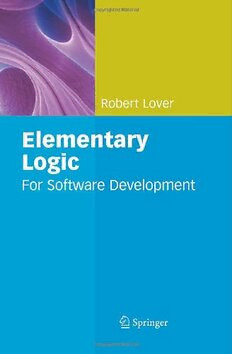
Elementary Logic: For Software Development PDF
311 Pages·2008·2.362 MB·English
Most books are stored in the elastic cloud where traffic is expensive. For this reason, we have a limit on daily download.
Preview Elementary Logic: For Software Development
Description:
The ability to reason correctly is critical to most aspects of computer science and to software development in particular. This book teaches readers how to better reason about software development, to communicate reasoning, to distinguish between good and bad reasoning, and to read professional literature that presumes knowledge of elementary logic. It explains fundamental concepts and provides reader-friendly instructions for applying logic to software developmentPart I explains how to find and represent the logical forms of statements expressed in English. Part II describes how to use truth tables to determine the truth or falsity of a complex statement. The final part discusses logical truth and explains how to test statements for logical equivalence, implication and redundancy, as well as how to test arguments for validity and soundness. It also explains how to use rules of inference to make proofs of program correctness. This useful text/reference emphasizes applications of logic to software development throughout.Features:• Covers elementary logic and its application to most stages of software development• Expresses examples in pseudocode, so that no particular programming language is used• Provides numerous examples and exercises facilitating reader self-assessment and independent self-study• Emphasizes truth-functional and quantificational logic, and introduces Floyd-Hoare logic• Supplies web resources such as solutions for all exercises and supplementary information• Emphasizes the difference between helpful and excessive use of formal notation• Written from class tested teaching material proven to be clearly understandableKey topics:• Expressing Problem Specifications• Expressing Program Designs• Using Truth Functions• Interpretations for Quantified Statements• Tests for Logical Properties of Statements• Simplifying Statements and Instructions• Rules of Inference for Control Structures• Program Correctness ProofsSince logic is the discipline concerned with general rules and criteria of correct reasoning, those involved in computer science and software development will benefit greatly from using this book. It provides a reader-friendly foundation to logic and offers valuable insight into the topic, thereby serving as a helpful reference for practitioners, as well as students studying software development.Robert Lover has been a software developer, has created and taught professional development courses for Harvard University, and has taught courses on logic and software development at several other colleges and universities. He is currently chair of the Belmont Abbey College Computer Studies Department.
See more
The list of books you might like
Most books are stored in the elastic cloud where traffic is expensive. For this reason, we have a limit on daily download.
